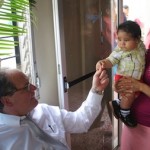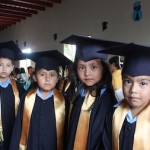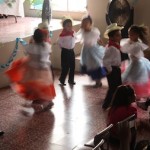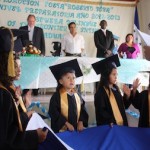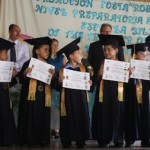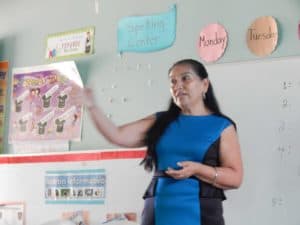
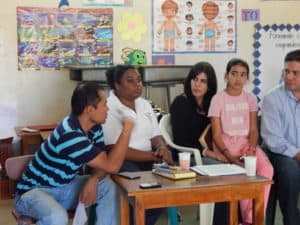
November 16, 2014
No one from my family had ever been to college. My dad was a truck driver who never finished high school. I recall vividly my father’s beaming expression, a mixture of hope and pride, the day he dropped me off at the University of Massachusetts. Yesterday, I sat in on the parents meeting at the Bilingual School of the Good Shepherd in Camasca, Intibucá. As I looked out upon those attending I experienced that eerie sense of déjà vu. Thirty-six years later, it was my father looking back at me with that same expression of hope and pride.
How different are the families here in Honduras, yet one thing is certainly universal. Parents want so much more for their children than they themselves obtained. Education, a quality education, is the key element to realize that goal. Education, a quality education, is simply not accessible to the great majority of Honduran families. Why hope, if hope yields disappointment? Perhaps it is better to take pride in more modest achievements. This must be the thoughts of most families raising children in Honduras. Those thoughts seem to be changing in the frontier region of Intibucá.
In 2012, Shoulder to Shoulder, the community of the Good Shepherd Catholic Church in Cincinnati, and the families of the frontier region of Intibucá dared to dream of a financially accessable, quality, bilingual school. The classrooms were designed and erected and today it is a reality with fifty-four students in kindergarten, first and second grade. It is a public school, available to everyone.
Public education has been a disaster in Honduras. There simply aren’t the resources. The buildings are not maintained, materials are non-existent, the teachers are minimally qualified, and the list goes on. Maybe Honduras needs to think about a new model. What about a partnership among the Department of Education, a committed NGO like Shoulder to Shoulder, the surrounding municipalities, and the parents themselves? There you have it, the Good Shepherd Bilingual School. This model school is a first in Honduras. There are a great many challenges that face the parents and partners of this endeavor. But it is only with great risk that great reward can be achieved.
Attorneys Plutarco Rivera and his wife Patricia Maria Sikaffy, were present at the meeting to present the proposed agreement for the foundation of the model, bilingual, public school. Attorney Rivera exhorted those present that if this “experiment” is to have success, it will be dependent upon the dedicated involvement of the parents as represented in their committee. In those expressions of hope and pride, another emotion was palpably present. These parents are determined; determined that their children will have an education that will place them on the path of success and fulfillment. In a few weeks on this website, there will be opportunity to support the parents’ determination by financially sponsoring one of their children. It will be a tremendous opportunity to ally ourselves with a phenomenal moment of transformation.
May these expressions of hope and pride be the force that yields enrichment!
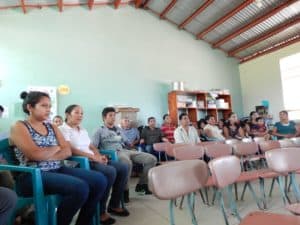
Bilingual School Graduation
In this part of Honduras, every accomplishment is worthy of celebration. On May 18, fourteen kindergarten students received their diplomas in the first graduation ceremony for the Frontier Bilingual School of Intibucá in Camasca, Honduras. In just its first year, the bilingual school has received accolades from the local community and from national educators.
The bilingual school is the first of its kind in the rural Honduras frontier. It provides the indigenous population, many of whose families live on less than two dollars a day, with a high-quality bilingual education. The school plans to add a grade each year as the students advance.
The 100 person-strong crowd and the leaders in attendance demonstrated the significance of this initiative in the Honduras frontier region. Shoulder to Shoulder President Wayne Waite, representatives from the Honduran Ministry of Education, and the mayor of Camasca attended and spoke during the celebration. The ceremony was played on national television in the days following graduation, further emphasizing the significance of this seemingly small accomplishment.
At the ceremony, the students, faculty, and community of Camasca expressed their gratitude to Shoulder to Shoulder and the Good Shepherd Community of Cincinnati for believing in the school and for helping make their dreams a reality. Shoulder to Shoulder director of Education Profesora Iris Villanueva told the crowd: “With this initiative, we have provided a beacon of hope for children in this region and set a precedent for others to follow elsewhere in the country.”
Click the links to learn more about the bilingual school, our scholarship programs, and how you can help.


